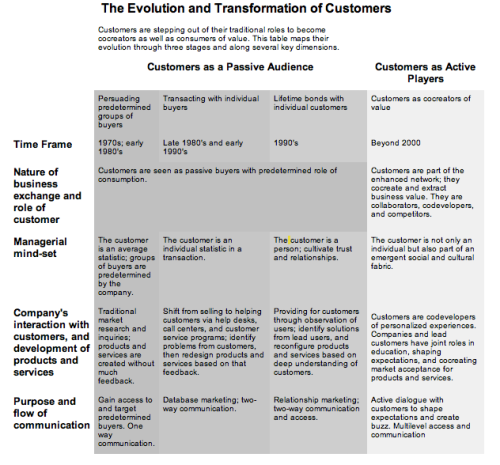Co-Creation according to Wikipedia, is the following:
Co-creation is a form of market or business strategy that emphasizes the generation and ongoing realization of mutual firm-customer value. It views markets as forums for firms and active customers to share, combine and renew each other’s resources and capabilities to create value through new forms of interaction, service and learning mechanisms. It differs from the traditional active firm – passive consumer market construct of the past.
Wikipedia points out that the concept of co-creation was first proposed by s
cholars C K Prahalad and Venkat Ramaswamy introduced the concept in their 2000 Harvard Business Review article, “Co-Opting Customer Competence”. The graphic below illustrates the author’s thesis, with the role of Customers as Active Players in production of goods and services in the right side of the table, outside of the traditional passive role of consumers with the grayed background. The table graphic links to an archived excerpt of the article.
In the ten years since the article was published, there have been many kinds of systems, mostly using the Internet, of course, that have tried to implement co-creation in various forms. Most have tried to involve users in the development process, usually with products and services that are tangible. I consider the implementation of Focus Groups to be one of the most concrete methods that most product manufacturers use to involve users directly in the development process. Though similar programs may have existed prior to 2000, in the current climate, they are not only necessary in the marketing of products, but to create them from the perspective of the target users.
The Wikipedia article points out that in the 3rd Stage of Co-Creation, “customers are becoming not only co-designers, but also manufacturers, using only the infrastructure provided by specialized companies.” This phase, I believe, is an extremely important one in the eveolution of production.
The suggestion is that users are becoming producers and that the means of production are being opened up to consumers and other collaborators. While the production facilities may be owned and operated by someone else, the resulting products and services, as well as, to an extent, the prices of output, are not being controlled entirely by the owners and operators.
Although the Co-Creation economy is easiest to see in digital output, there are many signs that the output is starting to have a profound effect on “real world” things. Customized LEGO kits are being made available to anyone that can “pre-sell” 3000 kits that are then packaged to order. Many wineries now create boutique labels for clients, not only by priniting custom labels, but by developing new wines based on the preferences of the client. In Japan, many mass market snack foods are customized for local and regional delicacies. The photograph below shows Shikwasa (Okinawan citrus fruit) flavored Hi-Chew, a gummy candy by Morinaga and Co.
I think that this trend will have a huge impact in the coming years. The importance of local products and culture is one that is distinctly human. We do need, as a species, to find new ways of preserving and growing local and regional customs and products. But these are not likely to survive without some new ways to share the good products and services across boundaries of time and space. The people who appreciate the local and regional may not be in the immediate local area. In addition, some of the products and services may be adopted by others if and when they are modified or customized in some small but important ways. This is the kind of cooperation and communication that makes customers co-creators, and users collaborators.
There are, no doubt, unforeseen glitches and before co-creation rebuilds local manufacturing and regional development, it is likely to help industrial giants like Morinaga and LEGO take away business from the small niche businesses in our local communities. But I have a gut feeling that this will shift. People will begin to see that there is profound value in the local, regional, and culturally rich goods and services that have been created over lifetimes. They just need a few loving retouches!


